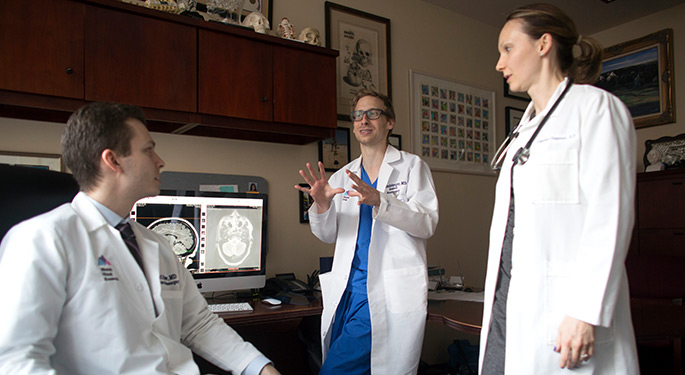
Research
The Center for Neuromodulation at Mount Sinai is committed to research so that patients can benefit from new and innovative treatments, including the pioneering research which has been heralded as one of the first hypothesis-driven treatment strategies for a major mental illness. Research is enhanced by the quality of the academic environment at the Mount Sinai Health System. In collaboration with the Nash Family Center for Advanced Circuit Therapeutics, this one-of-a-kind clinical and research hub works daily to translate research into personalized treatments, to correct brain circuit abnormalities for improved mood, motor, and cognitive functioning, and to maximize long-term outcomes.
Multi-Scale Investigation of the Living Human Brain
Multi-scale biology is a conceptual framework centered upon the idea that it is necessary to integrate many dimensions of data in order to understand the rules governing complex, dynamic physiological processes. Due to the inaccessibility of the human brain, however, rarely is it true that data from all of the components of the system in question can be measured in the same patient. This study circumvents this limitation by surveying a vast data landscape in patients undergoing the deep brain stimulation (DBS) implantation procedure. All diagnoses for which DBS is used as treatment at Icahn School of Medicine at Mount Sinai, be is standard of care or in the context of a clinical trial, are eligible for this study.
The primary study consists of obtaining biological samples from the brain, blood, and skin from each participant during the DBS procedure. In addition, participants who enroll in the main are given the option to participate in a secondary study, which consist of additional research procedures beyond the specimen collections. Specifically, participants who enroll in the secondary study will engage in a brief intraoperative cognitive task while neural recordings are performed.
As a whole, this study will generate an unprecedented amount of neurobiological information from each individual in living human cohort. In turn, this may yield new knowledge of human brain function and disease pathogenesis, as well as give rise to new diagnostic and treatment modalities.
DBS Database
The purpose of this study is to create a database with information on patients who have had DBS for the treatment of movement disorders, including Parkinson’s disease, dystonia, essential tremor, and Tourette syndrome. This database will allow us to better track patient outcomes and improve the quality of patient care by increasing our ability to predict these outcomes. Information for this database will be derived from medical records and will be used to help track patient outcomes for those who have had DBS.
Comparison of Quantitative Susceptibility and High-Resolution Tractography Magnetic Resonance Imaging Sequences with Micro Electrode Recording and Clinical Outcomes in DBS
The efficacy of DBS is largely dependent on accurate placement of the intracranial leads. As the quality of radiologic imaging improves, the standards for targeting need to be reevaluated to assure we are using the best available technology. The purpose of this study is to find out if a new imaging method can improve the accuracy of the placement of the DBS leads. We are attempting to compare image guided DBS with the gold-standard physiology/imaged based hybrid. We hope to develop an imaging protocol to supplant the need for microelectrode recording.
Clinical Trial for Major Depression Treatment
Electrophysiological Biomarkers to Optimize Deep Brain Stimulation for Depression
Traditional treatments for major depression include psychotherapy, medicine, repetitive transcranial magnetic stimulation, electroconvulsive therapy, and vagus nerve stimulation. A small portion of patients do not respond to any of these treatments.
The Icahn School of Medicine at Mount Sinai is running a single-center experimental trial of deep brain stimulation to the subcallosal cingulate region (Area 25) for treatment resistant depression (TRD). The goal of this study is to refine and optimize this treatment approach using a newly available neuromodulation system Medtronic Percept Brainsense platform that allows brain activity during ongoing therapeutic DBS to be recorded from the brain in real-time. This study will further define brain readouts that track depression recovery, providing novel strategies to monitor and guide treatment and device programming decisions in patients receiving DBS for TRD.
Participating Mount Sinai Programs:
- Depression and Anxiety Center for Discovery and Treatment (DAC)
- Center for Neuromodulation Nash Family
- Center for Advanced Circuit Therapeutics
To enroll in this experiment please contact 212-523-8164 or fill out this referral form.
For more information visit ClinicalTrials.Gov.